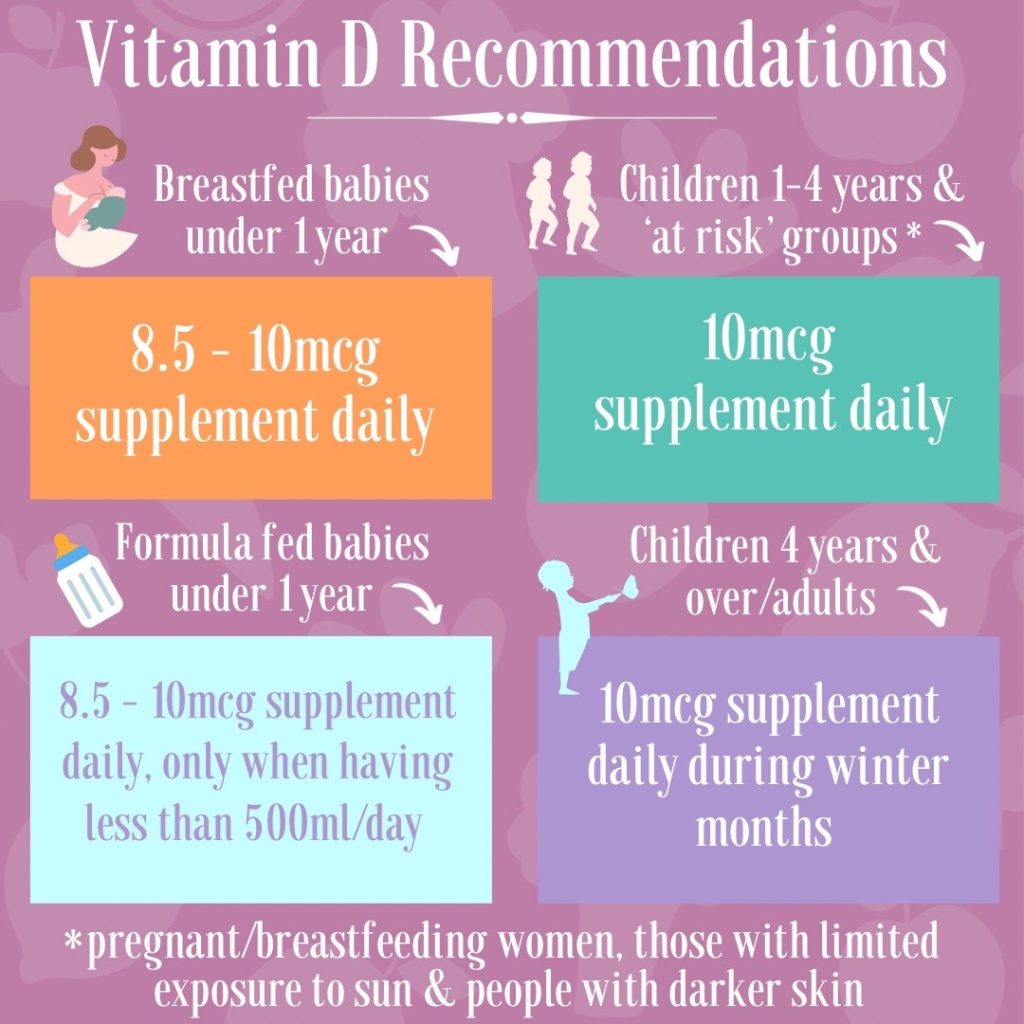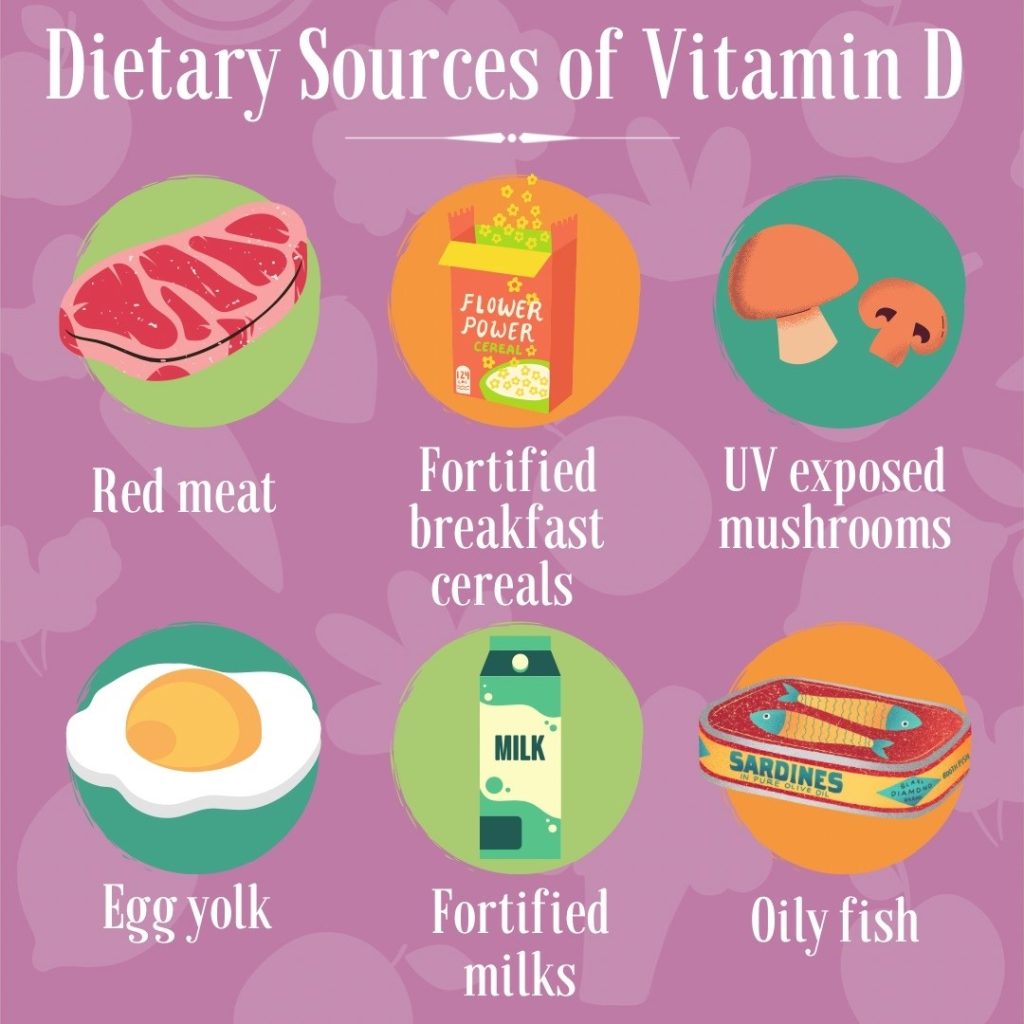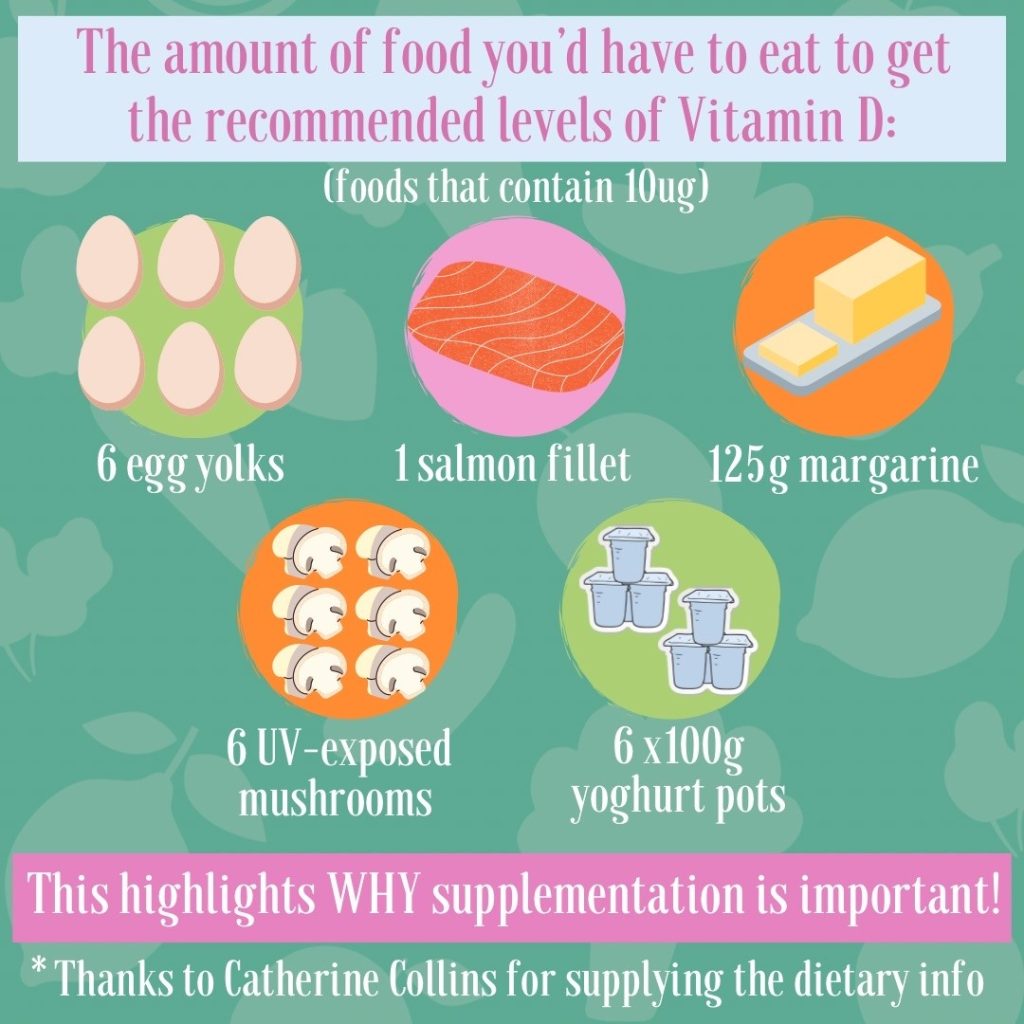Something I’m asked ALL the time is about which vitamins and supplements are recommended for babies and young children. I have a really comprehensive blog all about nutritional supplements for children and babies, but in this blog I wanted to summarise the recommendations for one key nutrient: vitamin D.
Most of the time, a varied, balanced diet is all we need to ensure we get enough energy, nutrients, vitamins and minerals each day. (You can read more about this and what a balanced diet is in my blog Getting the Balance Right for Toddler’s).
However, one exception to this is vitamin D and we actually have specific recommendations for vitamin D supplementation throughout the UK. Unfortunately, many people still aren’t aware of what’s recommended though.
In fact, recent research from the British Nutrition Foundation showed that almost half of the UK population said that they didn’t know about the government recommendations for supplementing vitamin D – that’s a huge percentage, especially since these guidelines have been in place since 2016.


Why do we need vitamin D?
Vitamin D is a hormone that is needed in the body to control the amount of calcium and phosphate in our body. Vitamin D (as well as calcium) is needed for healthy bones, teeth and muscles. Without enough of it we may see children developing a bone disease called rickets, and osteomalacia developing in adulthood. Vitamin D also plays an important role in supporting the normal functioning of our immune system.
What are the Vitamin D recommendations for babies & toddlers?
The current vitamin D recommendations from the UK government are:
- Infants aged 0-1 year
- Daily vitamin D supplement containing 8.5-10 micrograms of vitamin D throughout the year for infants who are breastfeeding, mixed feeding or having less than 500ml formula per day
Infants aged 0-1 year who are fully formula fed do not need a vitamin D supplement if they are having at least 500ml formula per day.
- Children aged 1-4 years
- Daily vitamin D supplement containing 10 micrograms of vitamin D throughout the year
- Children aged 4-11 years
- Daily vitamin D supplement containing 10 micrograms of vitamin D, during the winter months (October – March)
Not all vitamin supplements provide the recommended amount of vitamin D. Check out my blog comparing nutritional supplements for under 5s to help find a suitable supplement for your child.
What are the Vitamin D recommendations for adults?
- General population:
- Daily vitamin D supplement containing 10 micrograms of vitamin D, during the winter months (October – March)
- ‘At risk’ groups:
(Pregnancy, infants and children aged under 4y, those with limited exposure to the sun, people with darker skin)
- Daily vitamin D supplement containing 10 micrograms of vitamin D, throughout the year
For more on supplement recommendations during pregnancy, check out my blog.
The graphic below summarizes the recommendations for different groups:


Where does vitamin D come from?
Vitamin D is mainly synthesised in the body through UV rays from sun exposure, specifically in the months from April to September. Dietary sources of vitamin D include oily fish, red meat, egg yolk, UV exposed mushrooms, fortified breakfast cereals as well as fortified milks and spreads.
However, generally speaking, it is quite difficult to meet the daily recommended intake for vitamin D through food. The table below shows the vitamin D content of different foods. As you can see, there are not many foods that are particularly rich sources of vitamin D – particularly in amounts that are realistic for children!
| Food | Portion Size | Vitamin D (µg) |
| Salmon, red, canned | 140g | 15.3 |
| Mackerel, grilled | 140g | 11.2 |
| Salmon, baked | 140g | 10.2 |
| Mackerel, canned | 140g | 9.2 |
| Vitamin D-enriched mushrooms | 80g | 3.2 |
| Tuna, canned | 140g | 1.5 |
| Eggs (boiled / fried) | 1 egg | 1.1 / 1.6 |
| Fortified breakfast cereals | 30g | 1.4 |
| Roast Pork | 90g | 0.9 |
| Fat spreads | 10g | 0.8 |
| Beef mince, extra lean | 100g | 0.6 |
| Roast lamb | 90g | 0.5 |
| Calf’s liver | 100g | 0.3 |
| Chicken breast | 100g | 0.2 |
Adapted from British Nutrition Foundation (https://www.nutrition.org.uk/media/gyceqobk/vital-vitamin-d.pdf)


This image below, adapted from Dietitian Catherine Collins, shows which foods provide 10µg of vitamin D.


Who is at risk of Vitamin D deficiency?
There are certain groups of the population who have been identified as being more at risk of vitamin D deficiency and are therefore advised to take a daily supplement throughout the year. These are:
- Infants and children aged under 4y
- Those with limited exposure to the sun (e.g., if they cover their skin for cultural reasons or are housebound)
- People with darker skin – e.g. those with an African, African-Caribbean or South Asian background
A daily 10µg supplement is also recommended throughout the year during pregnancy. Everyone else is recommended to take a supplement throughout the winter months from April – October only.
Can you have too much vitamin D?
Whilst it is not possible to make too much vitamin D through exposure to the sun, it is possible to take too much through a supplement.
If you take too many vitamin D supplements over a long period of time, it can cause a build-up of calcium in the body, and may cause damage to the kidneys and heart, as well as weakening your bones.
If taking a supplement, certain recommendations apply:
- Children aged over 11 years, and adults: no more than 100 micrograms per day
- Children aged 1 to 10 years: no more than 50 micrograms per day
- Infants under 12 months no more than more than 25 micrograms
Taking more than these amounts on a daily basis can be harmful to health.


Summary
- Vitamin D is needed for healthy bones, teeth and muscles as well as supporting our immune system
- Food sources of vitamin D include red meat, oily fish, egg yolk and fortified foods (including breakfast cereals and fat spreads)
- However, it is difficult to meet the recommended daily intake for vitamin D through food alone
- A daily supplement is recommended throughout the year for:
- Infants and children under the age of 4 years (unless having >500ml formula per day) – 8.5 – 10µg
- Adults at risk of vitamin D deficiency (during pregnancy, those with limited exposure to the sun or have darker skin) – 10µg
- A daily 10µg supplement is recommended during the winter months (October – March) for children aged 4 and over, and adults